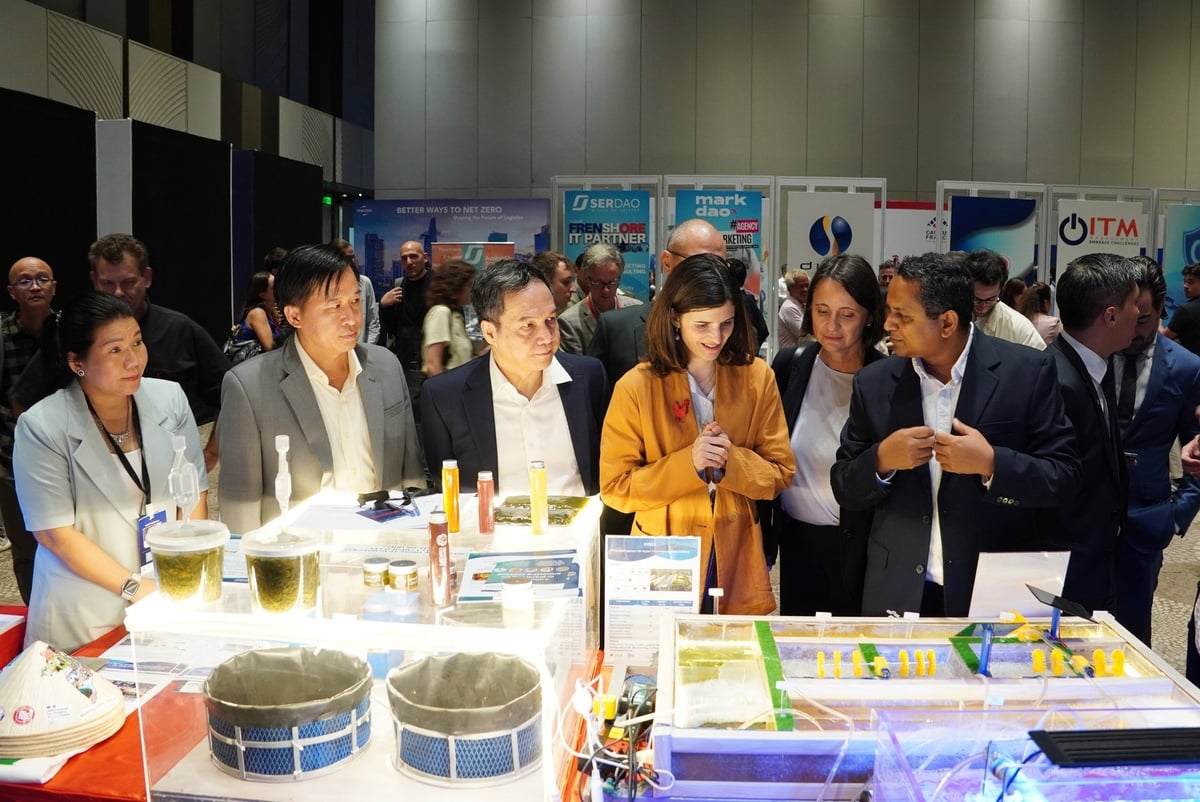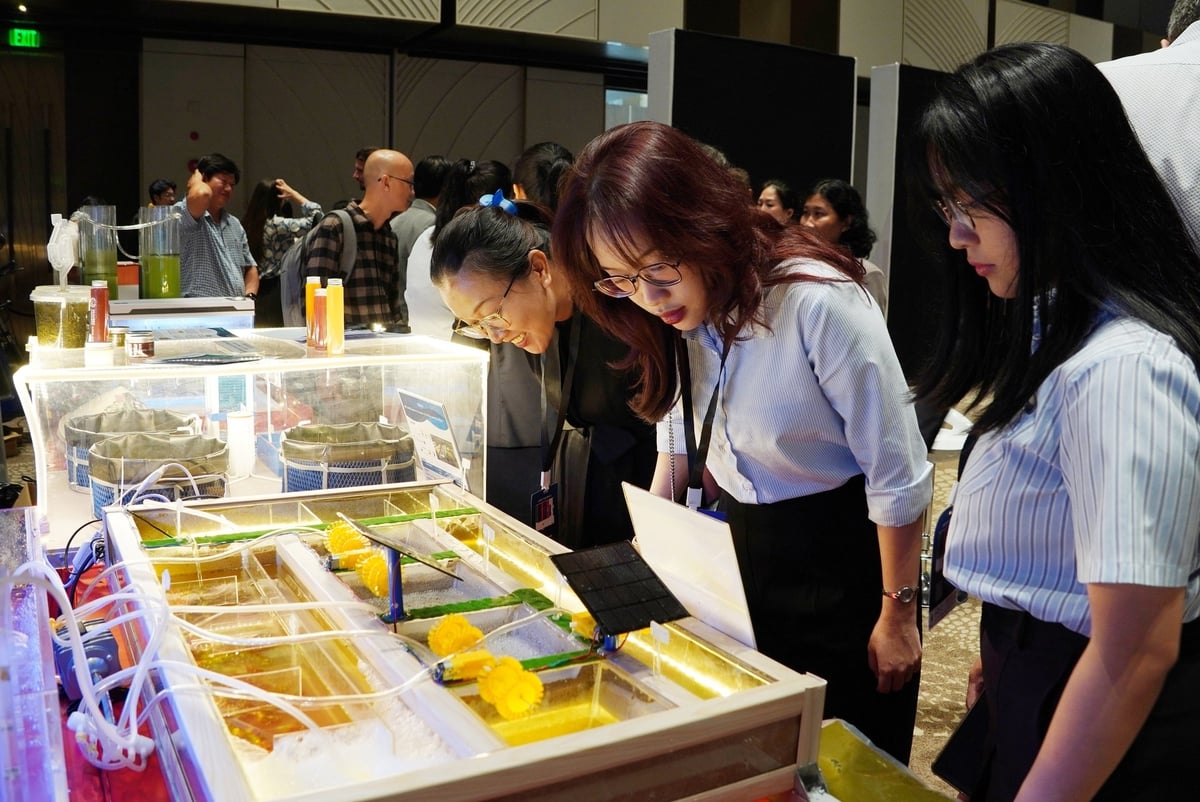December 31, 2025 | 02:00 GMT +7
December 31, 2025 | 02:00 GMT +7
Hotline: 0913.378.918
December 31, 2025 | 02:00 GMT +7
Hotline: 0913.378.918

Various technologies were showcased at CIRAD’s booth during the French Tech Summit Vietnam 2025. Photo: Nguyen Thuy.
As part of the French Tech Summit Vietnam 2025 recently held in Ho Chi Minh City, the French Agricultural Research Center for International Development (CIRAD) introduced the 3R4CSA project, which promotes climate-smart aquaculture in the downstream region of the Mekong Delta. This model has already been successfully and prominently applied in Ca Mau.
The project has attracted great interest from local authorities, businesses, and farming communities due to its ability to harmonize efficient production, environmental protection, and climate risk adaptation. In Ca Mau – a coastal province heavily affected by sea level rise and saltwater intrusion – the project has been piloted on an area of 50 hectares, yielding positive results in reducing production costs, increasing productivity, and improving farmers' incomes.
The 3R4CSA project is a vivid example of effective collaboration between France and Vietnam in the fields of science and innovation.
The connection between researchers, technology experts, and local communities not only helps the model adapt well to actual conditions but also promotes cross-sectoral cooperation in the transition to sustainable agriculture. Integrating cultural and social elements into implementation has also contributed to the project’s feasibility and community acceptance.
The project is funded by the FSPI Fund under the French Ministry for Europe and Foreign Affairs and implemented in coordination with the French Embassy in Vietnam, involving cooperation between Vietnamese and French research partners and the private sector.

A CIRAD researcher presents technologies currently being applied in aquaculture in the Mekong Delta, Vietnam. Photo: Nguyen Thuy.
FSPI (Fonds de Solidarité pour les Projets Innovants) is a key financial instrument of France that supports innovative initiatives in the fields of education, research, sustainable development, and climate change adaptation in developing countries.
3R4CSA aims to develop circular, biosecure, and low-emission aquaculture systems to transition traditional intensive farming into more sustainable production methods that contribute to green growth.
Circular aquaculture systems incorporate water reuse, by-product recycling for organic fertilizers, and polyculture, such as the combination of fish and shrimp farming with seaweed or other aquatic species, to optimize resource utilization and minimize pollution. Reducing greenhouse gas emissions from aquaculture operations also contributes to Vietnam’s commitment to achieving net-zero emissions by 2050.
In addition, the project promotes innovation in waste recycling, provides training for students and farmers, and lays the groundwork for technological transformation in the region.
Through technical training courses, thematic seminars, and field activities, the project has provided essential knowledge and skills to more than 300 farming households in Ca Mau, Bac Lieu, and Soc Trang.
At CIRAD's booth, along with partners such as Seaweed Concept, VietAime, the Research Institute for Aquaculture No. 2 (RIA 2), and Can Tho University (CTU), research results and advanced technological solutions were presented in an engaging manner that attracted significant attention from many partners.

Visitors explore the IMTA-RAS model - an integrated, multi-species, super-intensive, zero-discharge shrimp farming system. This is one of the models being effectively implemented in Ca Mau Province. Photo: Nguyen Thuy.
During the summit, CIRAD scientists participated in prominent activities, including an in-depth panel discussion on green technologies, the Start-up Pitch session of Le Booster Accelerator, and numerous exchanges at the booth, where they were joined by experts and founders of partner companies.
The panel discussion featured diverse perspectives from researchers, entrepreneurs, and policymakers, revolving around pressing topics such as the application of artificial intelligence in agriculture, ecological data management, and sustainable value chain development. This was a valuable opportunity for young startups to learn, network, and receive real-world feedback from the expert community.
CIRAD and its partners expressed their desire to expand collaboration with businesses and organizations both domestic and international, while also promoting the application of practical technological solutions to help build a green, smart, and climate-resilient agricultural sector.
In the near future, CIRAD plans to implement additional pilot models in An Giang and Ben Tre, and promote technology transfer through training programs for local technicians. Strengthening cooperation with the private sector is also considered a key strategy for commercializing innovative initiatives and scaling up their application.
The French Tech Summit Vietnam 2025, themed "Riding the Crest", attracted over 1,500 attendees, including policymakers, business leaders, investors, startups, and technology experts from France and Vietnam, together shaping a cross-border forum on technology, innovation, and investment.
Translated by Huong Giang

(VAN) Located in three former provinces, Nam Dinh, Thai Binh, and Ninh Binh, and now in two provinces, Ninh Binh and Hung Yen, "Red River Delta" is the name of Vietnam's first interprovincial coastal wetland World Biosphere Reserve.
/2025/12/29/1046-1-210728_624.jpg)
(VAN) In 2025, Viet Nam recorded severe and extreme disasters, breaking multiple historical records and causing heavy losses in lives, property, and infrastructure nationwide.

(VAN) Applied technologies, water-saving irrigation is a strategic solution to promote climate-resilient agriculture and strengthen water security in the uplands.
/2025/12/29/3936-3-163422_251.jpg)
(VAN) Can Gio mangrove forest in particular and the entire Can Gio Mangrove Biosphere Reserve in general hold great potential for carbon credits.

(VAN) Chu Pah Rubber has announced its products that comply with the EU Deforestation Regulation (EUDR), affirming its commitment to sustainable production and product origin transparency.

(VAN) Deputy Director Nguyen Hoai Nam stated that a digital data platform will be developed with agricultural sector databases, utilizing AI to help farmers make informed decisions on 'watering correctly, sufficiently, and efficiently.’
/2025/12/29/4841-2-134224_777.jpg)
(VAN) From only about 10 individuals in 2009, the wild elephant population in Dong Nai has recovered to nearly 30 animals after more than 10 years.